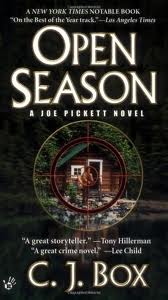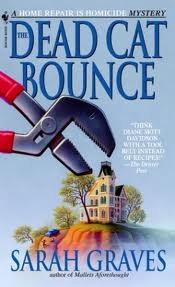Yesterday I talked about one of my shortcomings as a writer: I pull my punches. I claimed that I learned that from two atrocious, miserable books my professor made me read.
So what were the two books I hated so much? Open Season and The Dead Cat Bounce.
Open Season
 Open Season by C. J. Box is the story of a disgraced game warden in Wyoming whose livelihood and family are placed in the balance when his retired predecessor invests in a pipeline company that’s going to suffer financial loss because of a den of endangered weasels.
Open Season by C. J. Box is the story of a disgraced game warden in Wyoming whose livelihood and family are placed in the balance when his retired predecessor invests in a pipeline company that’s going to suffer financial loss because of a den of endangered weasels.
That’s right: endangered weasels. There’s relationship drama, job drama, gun drama, surpassing-the-mentor drama, and even child-molestation drama, but it’s all built on a foundation of weasels.
The story itself is boring and tedious. The hero is a pathetic loser who’s desperately worried he’s going to lose his job even after the writer has established he’d probably get a better standard of living working as a cashier at Wal-Mart. The narrative meanders around in the woods, moseys through a miserable, dirty little town, and introduces us to characters I’d really prefer not to know.
But through it all the narrator is constantly bemoaning the huge tragedy of everything…and in the end, he blows someone’s arm clean off. It’s bigger than reason, and it’s the foundation of an incredibly successful series.
The Dead Cat Bounce
 In sharp contrast, Dead Cat Bounce by Sarah Graves pulls its punches. It’s a mystery that starts with the narrator’s discovery of a corpse in her basement, which she sets aside (rhetorically speaking) to introduce a ditsy friend, describe how she came to live in this town, complain about the process of maintaining an old house, and consider how well her teenage son gets along with the local handyman before she returns to the only interesting aspect of the story.
In sharp contrast, Dead Cat Bounce by Sarah Graves pulls its punches. It’s a mystery that starts with the narrator’s discovery of a corpse in her basement, which she sets aside (rhetorically speaking) to introduce a ditsy friend, describe how she came to live in this town, complain about the process of maintaining an old house, and consider how well her teenage son gets along with the local handyman before she returns to the only interesting aspect of the story.
Every page of this book is a sheer torture because you can always see the interesting story you want to read, but the writer keeps it forever out of reach behind a dense, impenetrable barrier of backstory and exposition.
The worst part of that experience, though, was recognizing my own style in it. She has found a story worth telling, a big event worthy of a mightily swooping plot arc, but she wraps it in so many layers of everyday reality that the excitement inherent in the plot events is entirely untouchable.
At the same time, so many of the other stories we’ve read have gone big. They’ve gone huge. Hunger Games and How to Train Your Dragon introduced wild settings — the one adorable and the other devastating — and both entirely unbelievable but, at the same time, entirely engaging. Jeremy Fink and the Meaning of Life had the audacity to announce in the title that it intended to explain the meaning of life, and it followed through with a compelling tale.
I got into storytelling because of the power of story. I enjoy playing games with the written word, I like the feel of well-crafted prose and the special magic in poetic imagery, but I write to reach people. This class reminded me that it’s not enough to extend an invitation. I’ve got to follow through.
(Once again, I really wouldn’t recommend buying either of those books, but just in case you decide to disregard my advice, the links above are all affiliate links. That way at least some good will come of your misguided choices.)






Pow! (I had to get a punch in, because I think I pull my punches, too.) What a good analogy. I see myself working harder on getting the backstory into my novel than the front-story. Thanks for a great post. It hit me between the eyes!
When I first read your title for this post, I was picturing the “dead cat bounce” as some kind of ritual hunters employ at the start of open season on their favorite quarry.
Ah. Maybe I was right. That’s why the weasels are endangered. 😉